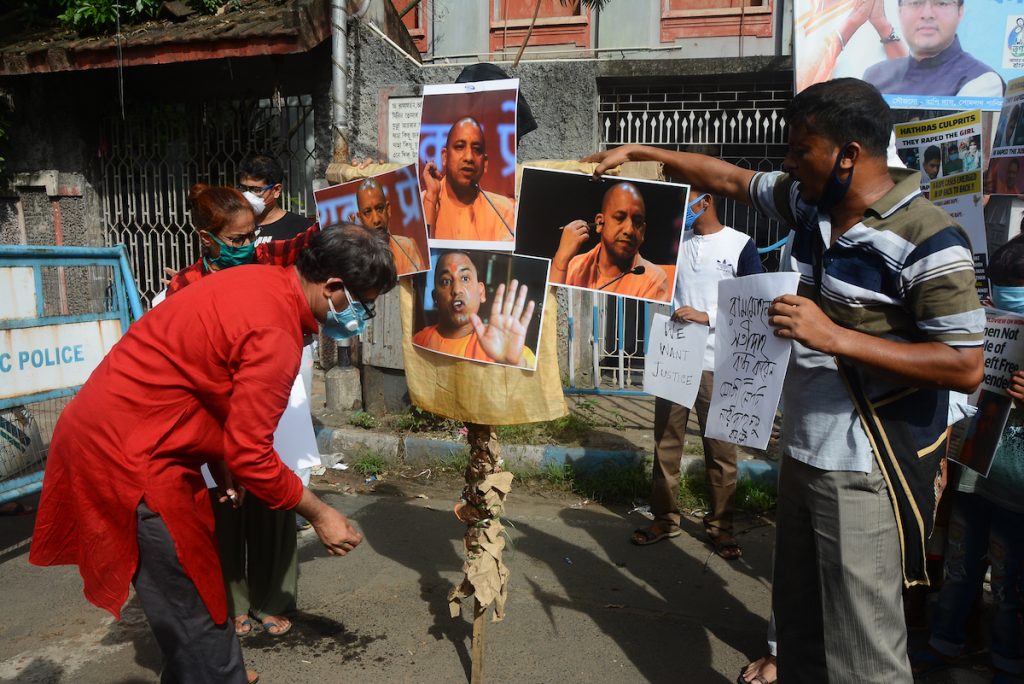An acid attack targeting three girls in a rural village in the north Indian state of Uttar Pradesh on Oct. 13 is being added to a growing list of attacks upon the socially marginalized Dalit people.
The attack occurred in the middle of the night when the three sisters were sleeping on the terrace of their house. The girls, aged 8, 12, and 17, were rushed to hospital where their condition is said to be stable. A man has been arrested over the attack.
While the motivations are not yet clear to police, some already see it as another attack upon the long-suffering Dalit community previously known as the ‘untouchables’ of India’s caste system.
The acid attack occurred on the same day as a 15-year-old Dalit girl reportedly hung herself, also in Uttar Pradesh, a week after she was allegedly gang raped by three men, one of whom was the son of a former village leader.
Again, on the same day, a 65-year-old man and his son from a Dalit community in Rora village of the state were allegedly attacked over a “trivial issue” by a group of men led by Sonu Yadav a member of an upper caste family. The father and son were reportedly forced to drink urine. Police have arrested Yadav and are looking for others involved in the attack.
On Oct. 12, the state’s top court accused the state government, ruled by pro-Hindu Bhartiya Janata Party (BJP), of siding with a group of men from an upper-caste family who allegedly gang raped and killed a 19-year-old Dalit girl on Sept. 14. After the crime the police later discreetly cremated the girl’s remains, leaving no room for any re-examination of her corpse.
Such examples are not unusual for Uttar Pradesh where the BJP state government has been repeatedly criticized for failing to protect minorities and those deemed from the lower-caste rungs of Indian society.

Joseph Dias, who heads India’s Catholic Secular Forum, said criminal elements in the state have been protected because of their higher caste status ever since the BJP — led by Hindu guru turned politician Yogi Adityanath — came to power in the state in 2017.
“There are higher castes whom seem to assume they can exploit and even worse enslave lower castes which is shameful,” Dias said.
“The silence of Prime Minister Narendra Modi and his ilk over the issue may give the impression that they are complicit and condone such acts,” he said.
Peter Sony, a Catholic advocate from Uttar Pradesh, said the immunity with which upper castes are targeting the Dalit community is indicative of how the BJP operate.
“The stigmatization, social ostracization and demonizing of minorities and lower castes have become hallmarks of the BJP government,” Sony said.
Sony referred to a June 13 incident when more than 100 upper-caste men, known as Thakurs, attacked a Dalit community after they learnt that several Dalit women attended a Hindu prayer service. Despite first information reports being registered with police against 29 people not a single person has been arrested, he said.
“The police tell you no reason. All they say is that they are investigating the matter. This is all we have in the name of justice here,” Sony said.
Dalits have the lowest status in the traditional Hindu social structure and even today in most of Indian states they are seen to be so “impure” that caste Hindus consider their presence polluting. They are forbidden to enter temples or use the same cremation grounds as used by so-called upper-caste Hindus of society.
Hindus also consider traditional Dalit occupations as tainted, such as working with leather, working with night soil and other dirty work.
“The fact is that the members of the so-called privileged class deem it as their right to kill, rape or hound a lower caste person,” Maryam Shami, a Catholic activist based in the Indian capital of New Delhi. The BJP does little to help exploited castes in the country, she said.
Shami said government records show that Uttar Pradesh alone accounts for over 25 percent of the total cases of hate crimes against lower castes in India.
“Crimes against Dalits are increasing. In 2016, the number was 40,000, it jumped to 43,203 in 2017. In 2018 it was 42,793 and in 2019 it surged to 45,935,” she said.
Researchers C. Vengateshwaran and Velusamydr Madasamy from south India’s Alagappa University said violence is used to dominate weaker sections of Indian society, particularly against Dalits in order to keep them under the control within the caste system.
“When Dalits claim their rights … the vested interests try to intimidate them down and terrorize them. Due to the lack of implementations of law, Dalits are facing the consequences,” they wrote in 2017 as part of a research paper.
There are an estimated 200 million Dalits in India, some 16 percent of the country’s population of 1.3 billion. In Uttar Pradesh, they constitute 21 percent of the total state’s population of 204 million.